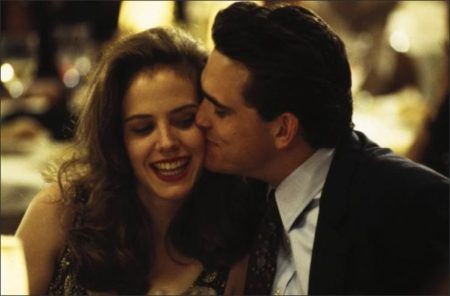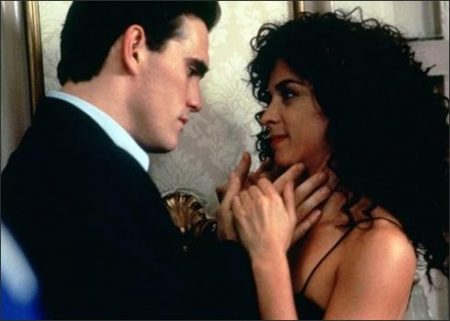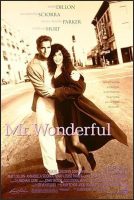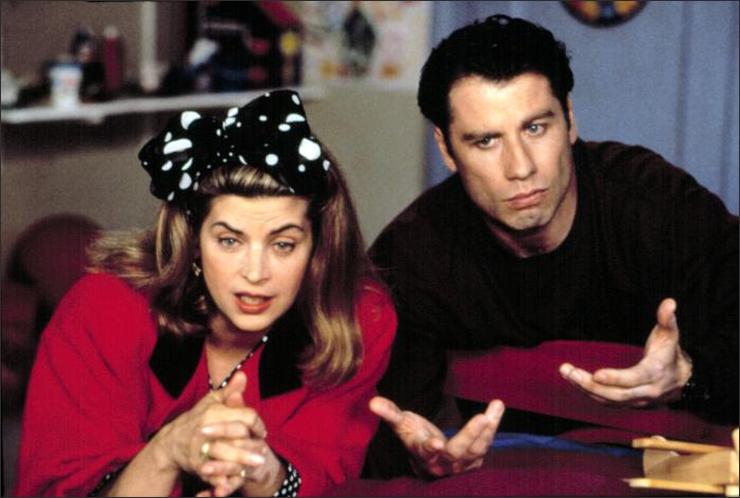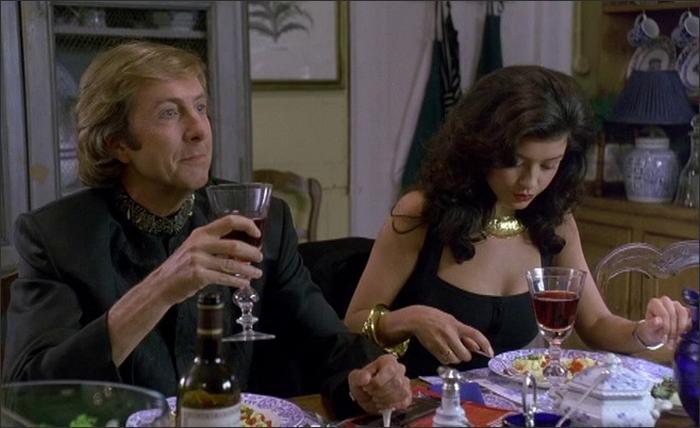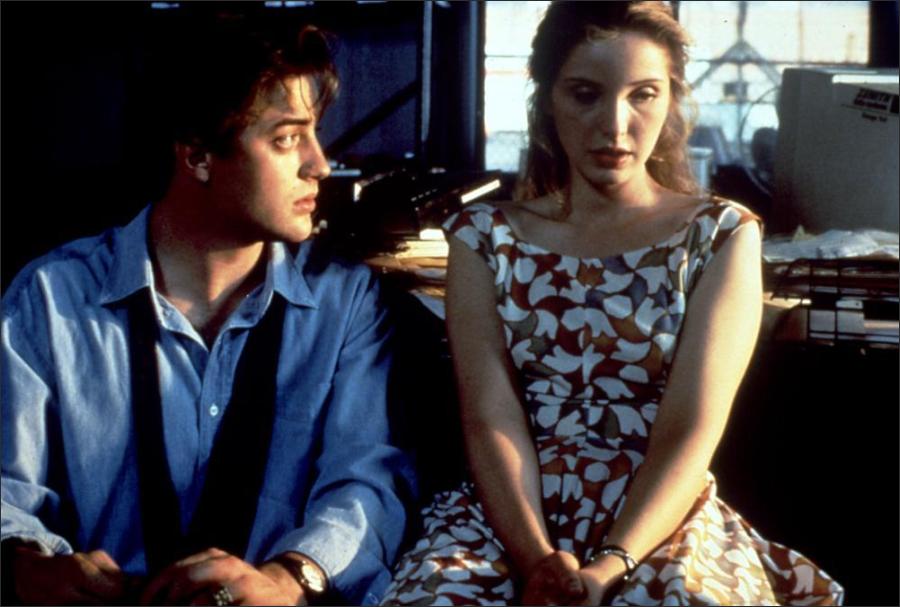Taglines: Sometimes love is a stranger. And sometimes it’s someone you’ve known all your life.
Mr. Wonderful movie storyline. Electrician Gus gets the chance to fulfill a childhood dream by buying an old bowling-alley with some of his friends. Unfortunately, due to the alimony payments he has to make to his ex-wife Leonora, the bank refuses to loan him the down payment. Knowing that when she marries again she loses her alimony rights, Gus tries to speed things up by bringing Leonora together with all the potential husbands he can find. Although this approach isn’t very successful, it awakens feelings in both of them they didn’t know they still had.
Mr. Wonderful is a 1993 romantic comedy film directed by Academy Award winning director Anthony Minghella. The film stars Matt Dillon, Annabella Sciorra, Mary-Louise Parker, William Hurt and features one of the few appearances of Vincent D’Onofrio as a romantic character.
Film Review for Mr. Wonderful
“Mr. Wonderful” (citywide) is a terrific little movie. There’s nothing terribly startling or original about it, and yet it doesn’t seem like any other film. Director Anthony Minghella and screenwriters Amy Schor and Vicki Polon understand the secret of a good romantic comedy: The characters must come first.
Gus (Matt Dillon) is a Con Edison electrical worker in New York divorced from his high school sweetheart Lee (Annabella Sciorra) and involved with Rita (Mary-Louise Parker), a nurse who wants him to stop stuttering the “C” word and commit to a relationship. Gus’ Con Ed buddies (wonderfully played by David Barry Gray, Dan Hedaya, Bruce Kirby and Luis Guzman) want him to go in on a scheme to restore a bowling alley in their Brooklyn neighborhood, but he’s strapped by alimony payments. A new scheme is hatched: Gus seeks out a Mr. Wonderful for Lee to marry.
This may sound schematic and conventional, but it’s done with a knowing wink. The characters themselves are aware of how cockeyed and contrived their predicament is. Gus and Lee go at each other in a way that tells you they still care. Their bickering has a well-worn, almost tender undercurrent. They understand on some level that their split was nobody’s fault, really–they’ve just grown apart–and that keeps the rancor from turning poisonous.
Gus is a good-time working-class Brooklyn guy and Lee just wants to leave all that neighborhood stuff behind her, so she’s enrolled in college and works in Brooklyn’s Botanic Gardens. She’s having an affair with a married professor (William Hurt, in an effective cameo) who likes to snuggle up with a volume of John Donne. She’s attempting to “better” herself, but she has enough humor about her current situation to know that she’s not really happy; she misses the juices in her old life without fully acknowledging the loss.
When Gus and Lee are together they become cruder versions of who they really are. Gus is by no means dumb, but he enjoys acting lunky and inarticulate; his prole charm is his badge of honor. Lee seems like a frizzy-haired hippie student–even her affair with the professor seems like a part of the act. (With her Italian-Catholic upbringing, it’s the part she’s least comfortable with.) This role-playing between them is a taunt, but it’s also a mating dance. Rita, who genuinely loves Gus, picks up on this right away, which is why she joins in the search for a Mr. Wonderful for Lee.
One of the most humane touches in “Mr. Wonderful” is the way Rita comes across as both desperate and proud. It would have been easy for the filmmakers to make her a conniving shrew but, as Mary-Louise Parker plays her, she’s marvelously intuitive and understanding. There’s a great scene where some of her women friends convince her that the way to snare Gus is to carry out an old folk legend and cry tears into his food. She’s flabbergasted by the idea but she ends up rubbing her tears into his gnocchi–she knows how foolish she looks but she wants him so much she’ll try anything.
Gus has his own boisterous foolishness. Convinced he can find a new mate for Lee–with Lee’s grudging assent–he cajoles the men on his lunch-break, inspecting their lunch-boxes to figure out who the bachelors are. He’s a knight errant in search of the man who will make Lee forget him, and so on some level he must want his mission to fail.
When he meets Lee’s professor lover face to face, he walks away the winner; he sizes him up as a cad with such withering split-second insight that your whole estimation of Gus is instantly upgraded. And yet the filmmakers give all the people in this film their due, even the professor. His last scene with Lee is just right: It has the awkward, bereft politeness of a final parting between two people who have nothing more to offer each other except regrets.
Minghella, who has written extensively for the stage and television in England, is known here primarily for directing “Truly, Madly, Deeply,” which suffered from an overdose of rue but had a standout performance from Juliet Stevenson. In “Mr. Wonderful,” the performances are so heartfelt that your sympathies are never narrowed to a single character.
In terms of its emotional range, there’s a lot to go around in this film. Dillon develops a comic style out of Gus’ lumpen swagger and slouch that, in its depth of feeling, goes way beyond shtick. Sciorra has never before seemed so ripely funny or sexy. And there are always wonderful surprises, like the moment when one of Gus’ friends, whose girlfriend is a real sexpot, whispers to him, “Ever hear of candy pants?” Or the moment when the local pharmacist, played by Vincent D’Onofrio, confesses his love to Lee by admitting he remembers her when they were 12 years old in Catholic school together.
“Mr. Wonderful” is unusual for a romantic comedy because it recognizes that there are real losses in the mating game; it doesn’t paper over the hurt that good, caring people experience. And yet everyone seems happy by the end. They may not all get what they want, but they’ve lived through their longings and they’re grateful to be in the game. They’re revivified by their ardor.
Mr. Wonderful (1993)
Directed by: Anthony Minghella
Starring: Matt Dillon, Annabella Sciorra, Mary-Louise Parker, William Hurt, Vincent D’Onofrio, Dan Hedaya, Jessica Harper, Joanna Merlin, Jennifer Alonzi
Screenplay by: Amy Schor, Vicki Polon
Production Design by: Doug Kraner
Cinematography by: Geoffrey Simpson
Film Editing by: John Tintori
Costume Design by: John Dunn
Set Decoration by: Alyssa Winter
Art Direction by: Steve Saklad
Music by: Michael Gore
MPAA Rating: PG-13 for some language and sensuality.
Distributed by: Warner Bros. Pictures (North America), The Samuel Goldwyn Company (other territories)
Release Date: October 15, 1993
Views: 225
